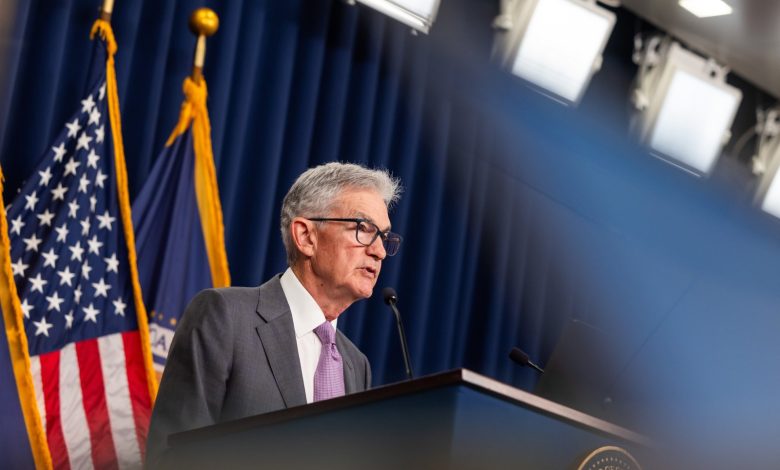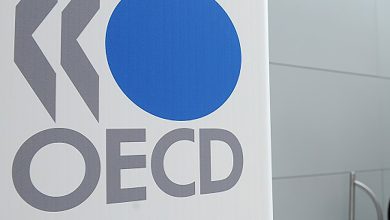Fed minutes, Jackson Hole, PMI data: Economic week ahead

Central bank updates would take center stage in business and market talks in the upcoming week as top officials gather at the Kansas City Fed’s Jackson Hole Economic Policy Symposium for the annual event.
One of the longest-standing central banking conferences in the world, dubbed “Davos for central bankers,” is set to take place between Aug. 22 and Aug. 24.
Among others, fresh global PMIs are also due this week, while final data on eurozone inflation and Japan’s July inflation are likely to provide insights on future moves on the policy standing in these regions.
Here’s your guide to the week ahead in financial markets:
Jackson Hole
Central bankers from around the globe gather in Jackson Hole, Wyoming, from Thursday for the U.S. Federal Reserve’s (Fed) annual conference to chart the way forward for monetary policy.
In focus this year are labor markets – a shift away from last year’s inflation theme.
Fed chief Jerome Powell gets a chance to fine-tune his message before September’s monetary policy meeting. With recent turmoil in global markets and more positive U.S. retail sales and inflation data, all eyes would turn on Powell’s economic message on Friday.
Most market participants believe the Fed will begin cutting rates next month, after months of keeping them elevated to tamp down inflation. The U.S. inflation eased to below 3% in July, which marked the mildest year-over-year increase in over three years.
How big the world’s foremost central bank will go, and how deeply it will eventually cut, remain open questions: a spate of recent alarming economic data – including unemployment numbers – pushed investors to ramp up bets on a 50 basis point cut in September.
According to the local media reports and earlier statement from the central bank, the governor of the Central Bank of the Republic of Türkiye (CBRT) Fatih Karahan is set to join the symposium in the U.S. as well.
Due to the central bankers’ meet, the Turkish central bank also moved the schedule of its Monetary Policy Committee (MPC) meeting to Tuesday instead of Thursday. The bank is widely expected to hold rates unchanged at 50% on Tuesday, multiple surveys said.
Mixed picture
The outlook for global growth is another piece of the puzzle. Markets are febrile and struggling to assess the economic outlook as business activity softens but inflation stays above central banks’ target levels.
Purchasing managers’ indexes (PMI) deliver a real-time snapshot of economic activity and – with most of them out on Thursday – will provide the next set of clues.
July’s PMIs suggested an economic slowdown combined with persistent inflation, showing why central banks are in a bind.
U.S. manufacturing activity weakened and German numbers were surprisingly dour, indicating Europe’s economic powerhouse is contracting. But manufacturers’ input prices in advanced economies hit an 18-month high.
Inflation will dictate the pace and depth of future rate cuts. A repeat of July’s dour PMI trends might mean monetary easing happens more slowly than markets would like.
Irate over rates
The Bank of Japan’s (BOJ) sudden pivot from uber-dove to ultra-hawk has put it in the firing line for lawmakers, after peppering its surprise rate hike at the end of July with hints of more to come.
One unexpected result was the steepest rout for Japanese stocks since 1987’s infamous Black Monday, amid a destabilizing spike in the yen against the dollar.
Politicians set to grill BOJ Governor Kazuo Ueda and his peers on Aug. 23 will do well to remember some of their most senior figures were leaning on the central bank to help reverse the yen’s exceptional weakness in the run-up to the move.
Recent macroeconomic indicators at least have been on the BOJ’s side, showing a stronger-than-expected rebound in growth amid a recovery for consumption. Japan’s economy grew by a much faster-than-expected annualized 3.1% in the second quarter, official data showed on Thursday, rebounding from a slump at the beginning of the year,
A potentially bigger test for Japanese policymakers comes the day of the special parliamentary session, with the release of the latest consumer price figures.
Democrats on display
With the economy turning to be one of the central points at the heating U.S. presidential race, markets as well as voters are closely following the steps of both candidates and the pledges they have been delivering.
As Chicago prepares to host the Democratic National Convention, the party members would be aiming to generate fresh momentum for the candidacy of Vice President Kamala Harris.
Since her late entry into the race after President Joe Biden stepped aside, Harris has galvanized Democrats and erased the lead of Republican candidate Donald Trump in some opinion polls, edging ahead of Trump in some betting markets ahead of the Nov. 5 vote.
The four-day convention kicks off on Monday with a series of high-profile Democrats expected to give speeches geared toward rallying support for Harris.
The race is tight and investors are hoping to learn more about her policy positions.
Harris has been at pains to emphasize she would never interfere in Fed independence – a view that contrasts sharply with that of the Republican nominee and former president, who said presidents should have a say on Fed decisions.
Tensions
A confluence of risk factors has pushed and pulled global energy markets in recent days, and there is little sense that will abate.
Concern that conflict is spreading in the Middle East and threatening supply from the region has lifted international crude prices above $80 a barrel.
At the same time, worries about the strength of demand, particularly in China, are somewhat limiting oil’s gains.
European wholesale gas prices meanwhile have been volatile, with the specter of Russian gas supply disruption on a transit route via Ukraine amplifying Middle East concerns.
Markets are concerned that heavy fighting near the Russian town of Sudzha, where Russian gas flows into Ukraine, could result in a sudden stop to transit flows via the war-torn nation before a five-year deal with Russia’s Gazprom expires.






